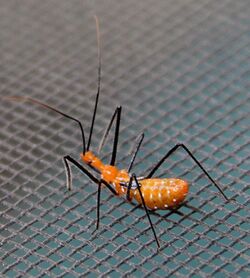Biology:Zelus longipes
From HandWiki
Short description: Species of true bug
| Zelus longipes | |
|---|---|

| |
| Scientific classification | |
| Domain: | Eukaryota |
| Kingdom: | Animalia |
| Phylum: | Arthropoda |
| Class: | Insecta |
| Order: | Hemiptera |
| Suborder: | Heteroptera |
| Family: | Reduviidae |
| Genus: | Zelus |
| Species: | Z. longipes
|
| Binomial name | |
| Zelus longipes (Linnaeus, 1767)
| |
Zelus longipes is an assassin bug (Reduviidae) that is a member of the Harpactorinae subfamily. Its distribution ranges include southern North America, Central America, and South America (except Chile),[1] especially in agroecosystems in Brazil.
Zelus longipes has been considered as a potential biocontrol agent, as it prefers caterpillars of Spodoptera frugiperda, which is a moth that is a pest in cornfields. [2] The species is a generalist predator, commonly used to combat picture-winged flies (Diptera: Ulidiidae), which cause damage to sweet corn yields in Florida. [3] Z. longipes prefers smaller caterpillars, probably because there is less risk of injury while subduing smaller prey.[4]
References
- ↑ Hart, E. R., 1986: Genus Zelus Fabricius in the United States, Canada, and Northern Mexico (Hemiptera: Reduviidae). Ann. Entomol. Soc. Am. 79, 535–548
- ↑ Sparks, A. N., 1979: A review of the biology of the fall armyworm. Fla. Entomol. 62, 82–87
- ↑ M. Kalsi, D. R. Seal, G. S. Nuessly, J. L. Capinera, C. G. Martin, Distribution of Zelus longipes (Hemiptera: Reduviidae) in South Florida Corn Fields and Its Functional Response to Corn-Infesting Picture-Winged Flies (Diptera: Ulidiidae), Environmental Entomology, Volume 43, Issue 5, 1 October 2014, Pages 1223–1234
- ↑ R. Cogni, A. V. L. Freitas and B. F. Amaral Filho. "Influence of prey size on predation success by Zelus longipes L. (Het., Reduviidae)". J. Appl. Ent. 126, 74–78 (2002). http://life.bio.sunysb.edu/~rcogni/Cogni%20et%20al2002.pdf.
External links
- Zelus longipes on the UF / IFAS Featured Creatures Web site
Wikidata ☰ Q8068843 entry
 |

